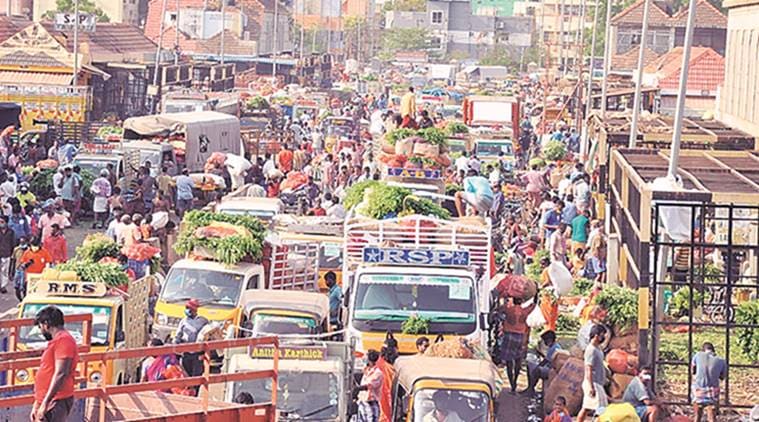 Koyambedu market area has around 500 shops. (Express)
Koyambedu market area has around 500 shops. (Express)
Having registered a sharp spike in COVID-19 cases over the past 48 hours, the Koyambedu wholesale market complex – one of the largest perishable goods markets in the country, spread across over 250 acres in Chennai – has authorities scrambling for corrective action. The market was shut down on Monday for a massive disinfection drive.
Authorities point to the density of people and vehicles in the market and a lack of basic facilities. Even though measures were implemented since the last week of April, they fear that the action may not suffice.
The market area has roughly 500 shops – each with 3-10 workers and handling up to 300-400 vehicles each day. It is the largest source of perishable products for Chennai, districts in northern Tamil Nadu and even Tirupati and Nellore in Andhra Pradesh. On an average day, the market gets 50 per cent of its products from Karnataka, Andhra Pradesh, Kerala, Gujarat and Maharashtra, among other states.
As the number of cases from the market rose over the past week, the Greater Chennai Corporation and the state Health Department have been putting in place control measures in the area. On Monday, an IPS officer who was handling operations at Koyambedu also tested positive.
While 92 cases were reported from the market on Sunday, the total number of cases on Monday shot up to 300. The total number of cases in Tamil Nadu touched 3,550 with 527 cases reported on Monday, the highest single-day figure in the state. While the death toll was 31 with one more death reported on Monday, Chennai city alone reported 266 cases in a single day. Cuddalore, that had just 39 cases on Sunday, recorded 122 cases on Monday.
One of the main concerns is the spread of the cases because of the high density of visiting traders. More than 1,600 cases have been reported from Chennai so far. Even as the number of cases from the market started rising since Saturday, several traders and market workers had already travelled back to their towns and villages.
According to authorities, 63 cases in Chennai, 129 in Cuddalore, 42 in Ariyalur and 76 in Villupuram, districts, were some of the cases uncovered on Monday that were connected with the market.
A senior functionary in the government said a survey of people who worked at the market is still in progress. “By Sunday evening, we identified some 7,500 people who worked there and left Chennai for their native villages. We have alerted all district administrations, shared details to trace and quarantine them. We have village vigilance committees across the state comprising elected representatives, young volunteers and other government representatives, including police. These committees are now reporting details of people who reached their villages in the recent days,” he said.
S Chandran of the Periyar Market Management Committee, a licensed merchants association at Koyambedu, said restrictions had been put in place in the market after the authorities held a meeting on April 27-28. “They had evicted hundreds of retail vendors. Fruits and vegetables shops were shifted to another location, Madhavaram. Only wholesale shops are functioning now. But ever since the lockdown started, the number of workers has been steadily declining as their survival here was difficult. If there were at least 10 workers each in a wholesale shop earlier, only 2-3 are left now. Massive job loss due to the ban of retail vendors also affected many. Fresh cases being reported from districts are these workers who left for their homes,” he said.
The Chennai Metropolitan Development Authority (CMDA) administers the market.
Even as basic measures were implemented taken to disinfect the market area, a senior police officer who had been monitoring situation for over a month said a rise in cases was inevitable. “During peak hours of trade, between 3am to 11am, social distancing was impossible. The CMDA should have acted earlier, the market should have been shut partially. But nobody acted till the third week of April. What they had decided to do in the last week of April should have been done in March itself,” he said.
And a four-day long ‘intensified lockdown’ declared on April 24 worsened the crisis, the official said adding that it triggered panic buying in the market.
IAS officer J Radhakrishnan, who has been appointed to monitor the situation in the city said cases were increasing because the sample testing also has been doubled. “No need for panic but we have to be careful. A large majority of cases in Chennai city were asymptomatic; which is a positive sign as well as a matter of concern